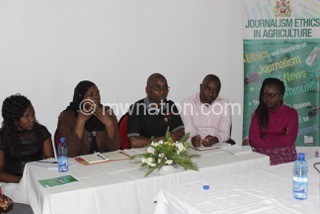Avoid fake news-MACRA
Malawi Communications Regulatory Authority (MACRA) Director of Broadcasting, Fergus Lipenga has advised, community radio stations to be professional and avoid sensationalizing news reports.
Speaking at the on-going media training on Agriculture Ethics, in Salima, Lipenga said, community radio stations have a greater impact within the communities and farmers value the information.

“Most farmers actively participate in various agricultural programs that are offered by community radio stations as per license obligations which is to serve the interest of the community, so if the messaged are twisted, it becomes a problem,” he said.
Lipenga further said community radios are owned by the people and are therefore licensed to serve the interest of the people by broadcasting matters affecting them of which farming is the central point.
“It is therefore paramount that community radio stations be professional on how they handle news, its important to crosscheck facts and avoid any fake news as the impacts could do more harm than good.
“As one way of making sure they access news, community radio stations can also partner with organizations which are within their vicinity, in this way, they not only strengthen their source base, but also acquire skills and probably resources which they may not be readily available to them,” he said.
Therefore: as one way of promoting active participation between farmers and the media, the New Alliance Acceleration Support (NAPAS) conducted a panel discussion with journalists from various community radio stations across the country.
The journalists outlined the interface opportunities with community radio stations and how they work with the locals in disseminating agricultural information on both radio and Television.
One of the participants from Nkhotakota Community Radio Station, Edward Kuwacha said:
“At a community level, most of our programs focus on agriculture since our target audience is geographically based of which most are farmers. Among other things, we work with Nkhotakota Agriculture Development Division (ADD) and Farm Radio Trust (FRT).
These institutions provide us with necessary information and issues in the agriculture sector.
For example, FRT is civic educating farmers through jingles and programs on the “Fall Army Worm”, said Kuwacha.
Kuwacha further said one of the major challenges encountered by community radio stations is capacity gaps because there are very few trained personnel who have Certificates or Diploma in journalism.
“However using basic training and partnerships some community radio stations do produce real impact agricultural radio programs even without sponsorship .
However programming can be improved if ministry of agriculture or NAPAS can strengthen the net working and create a platform of having exchange visits between community radios and big
media institution such as Malawi Broadcasting Station (MBC) , Zodiak and other private institutions even those in print media institutions,” he said.
The media workshop was organized by Ministry of Agriculture, Irrigation and Water Development (MoAIWD) with support from United States Agency for International Development (USAID) through the New Alliance Policy Acceleration Support Project (NAPAS-MALAWI).





